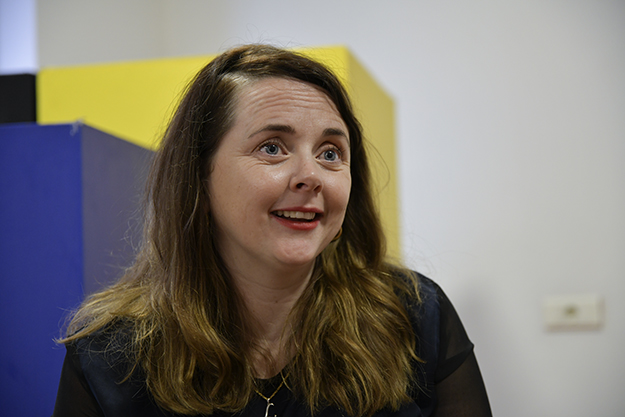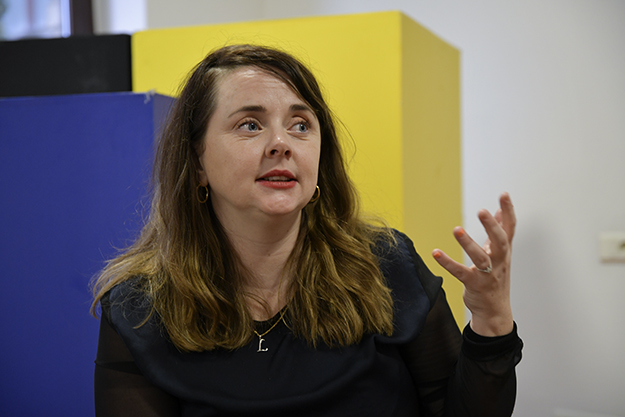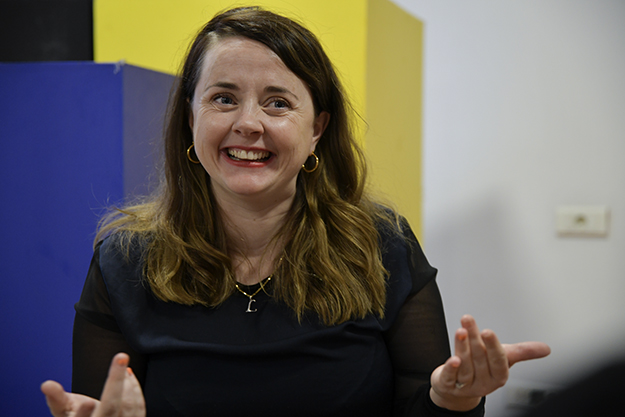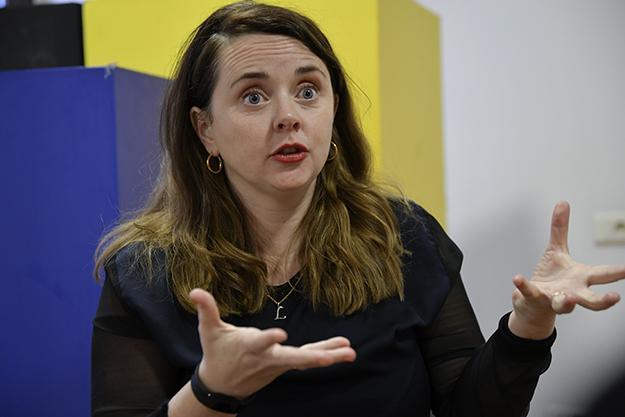Lara Whyte was at the scene of some of the most pivotal global events in recent years, but she was not breaking news.
Instead, she sought to give a more comprehensive insight into the world’s major developments; while trying to get in as many layers and perspectives as possible, creating the most accurate version of the truth.
The London-based Northern Irish investigative freelance journalist and documentary producer, has been particularly interested in issues that historically would be excluded and overlooked in the media: How the dynamics of gender play out in activism, political movements (left-wing or right-wing), battlefields, conflicts, or epidemics.
Sometimes she is close to the frontlines. She interviewed the all-female brigade of the Kurdish militia in Syria and Iraq. Known as the YPJ (Women’s Protection Units), they are part of the Syrian Kurdish Resistance and have been fighting ISIS since 2011.
Last year, she published a book, “Freedom Fighter: My War Against ISIS on the Frontlines of Syria,” that documents Joanna Palani’s extraordinary account of her life. Palani made headlines when she left Denmark to become a YPJ fighter against ISIS in the Syrian war.
“ISIS fighters are very easy to kill,” Palani told Whyte for her 2016 Vice story. Palani was stuck in Denmark at the time. Authorities had confiscated her passport for illegally joining the Kurdish forces.
But Whyte has also profiled female hardline right-wing activists. The characters in the center of today’s most critical events are the protagonists of Whyte’s stories.
Sometimes she investigates events whose consequences are forgotten, such as women battling post-Ebola teen pregnancy in Sierra Leone. At other times she explores gender and the far-right movement in Europe. Last year the BBC released her documentary, “In the Right,” where she investigated the young women involved in the movement.
“Gender, young people and extremism” are some of the key areas she is interested in, she tells K2.0.
Whyte, a familiar name in the BBC, The Guardian, Daily Mail, Channel 4 News, VICE, ITV and openDemocracy, brought her experiences to Kosovo for a Volume UP talk at the Hub K2.0. She spoke to us about covering Kurdish fighters fighting ISIS, women in the far-right, and feminist investigative journalism.

Photo: Atdhe Mulla / K2.0.
K2.0: Your portfolio is massive, as a journalist and editor for some of the most respected media in the UK and Europe, and the author of some incredible work. How did this journey in journalism start?
Lara Whyte: My first job was in Belfast, I worked for the community radio station and it was the first time I became interested in particularly international stories. Then I went to University and studied Drama in English. Very useful degree (laughs), and then I became interested in radio.
Radio was where I started and I had quite a lot of guests from all over the world, in particular a group of female activists who were so incredibly brave. They were Women of Zimbabwe Arise (WOZA), who were trying to get rid of Mugabe and were taking this huge risk to do so.
As well as a group called RAWA, which is the Revolutionary Association of the Women of Afghanistan. This is when I started listening to women who were radical in their ideas and approach to women’s rights.
That was the first time that I kind of thought that journalism could be a goal for me to pursue essentially women’s rights and women’s stories. That’s when I decided “Ok maybe I‘ll try to be a journalist.”
In TV news where I pitched a lot of stories about women’s rights or tried to work on stories about women’s rights, editors were like “this isn't the story.”
So after college, I did a radio production course in Dublin. Radio can give you lots of space to debate, in contrast to video.
At times of my life when I worked for big news organizations — that has been quite challenging because the editor’s viewpoint to what the story is might be slightly different from mine. And I did so many stories about the Royal family in the UK, I had enough of that.
But it was through the radio, the community radio was how I got into journalism. Hearing people’s different points of views led me to online work, because you now we had this big explosion of social media and internet and suddenly we could hear from everybody.
I was very motivated by that and very impressed by the potential of the internet. Probably a bit naively, that it will be an amazing democracy and the internet will change the world. It has changed the world, obviously.
But I thought it will smash the mainstream media and create something new. The longer I have been a journalist, the more I think journalism is a skill and it is really a hard skill. I don’t think just anybody can be a journalist because you can type something online.
Your work is focused on gender. Did you really have to push for your stories?
Yes. A lot of my attempts were really unsuccessful for quite a long time. Because women’s rights were seen as NGO issues. That’s why the internet has been amazing because suddenly you have readers who want those stories.
In TV news where I pitched a lot of stories about women’s rights or tried to work on stories about women’s rights, editors were like “this isn’t the story.” The only story I could really push was animal rights. I am a big fan of animal rights but they are not the only thing I care about, or I could push stories about the environment.
It is not accurate to only watch men take part in stuff because women have always been part of movements.They have always been part of wars.
Female protagonists [in the stories] were the victims normally, so that narrative was something I really wanted to disrupt in my work and online. And I did find an audience.
So I would pitch stories about rights and justice and initially the editors would be reluctant. But online they did very well. People wanted to hear them.
The women interviewed in your stories vary from survivors or direct participants of war, to those who make controversial and problematic figures, such as members of right-wing groups. Are the choices of your topics and characters also a bit intentional, in order to paint an unconventional portrayal of women who do things that are considered masculine?
It is a bit of both to be honest. The kind of stories and things I like to focus on are gender, young people and extremism. And so Joanna Palani is kind of three of those in one.
I turned the relationship I had with her into the book. I think with her I have done so many stories about the Yazidi genocide, the horrific crimes that ISIS enacted against the female popluation and the Yazidi; but also against Syrian Christians and all sorts of minorities within Iraq and Syria.
It was like a backlash to the women’s rights and freedoms that were hardly won across Europe and around the world. The stories that I try to find and the stories that editors like, are stories of defiance. Because I think the narrative we have in the mainstream media is still very boring about women and it is also not true. It is not accurate to only watch men take part in stuff because women have always been a part of movements.They have always been part of wars.
And holding guns like Palani, which is not a picture we have very much…
Very much so. With the Kurdish Army, the YPJ, they really fascinated me for so many reasons. I started that story through the work I did on the Yazidi genodcide. A lot of Yazidi women were captured by ISIS and then they made these incredibly brave escapes. In the media reports about what subsequently happened to Yazidi women, it was all about the victimhood.
So I went to the army thinking one thing and, as always, the grey comes out. It is always grey. It is never black and white.
Whereas actually, the ones I met, they escaped. You know I knew a 14-year-old [Yazidi girl] who jumped off a four story building onto another four story building to escape. When I read about her in a different newspaper, I will not name it, it was all about her victimhood. Actually she was a survivor, she wasn’t a victim.
That differentiation was really key for me. Some Yazidi former captives joined the Kurdish Army. The Kurdish Army has an all female wing and they go by the teachings of Abdullah Öcalan, and they consider themselves to be a feminist army.
So my inquiry into that was how the west is supporting this army and also what is this army doing on the ground? The more I got into that story the murkier it became. Because I think for Kurdish propaganda purposes, these women fighters were amazing and that was absolutely true. But often the International Coalition against ISIS were hiding behind these groups of teenage girls.
When teenage girls were going to a fight, they were trained to be suicide bombers.They were trained to use crazy guns, they were trained to make bombs. One of the girls I spoke to told me that women have smaller fingers and are better at making bombs.

Photo: Atdhe Mulla / K2.0.
So it was a really interesting gender dynamic in that army that I wanted to look into. And I am still not convinced that we have the full story about that army actually. They [Kurdish female fighters] have very strict rules imposed on them. For example, around virginity. I think a feminist army should not be controlling the sexuality of its members.
So I went to the army thinking one thing and, as always, the grey comes out. It is always grey. It is never black and white.
But can you ever have the full story? Can journalists get the full story?
I often think a lot of reporting is quite lazy. You know we speak to that politician and we speak to that other politician. We speak to that victim or that other victim. We speak to that person who is a perpetrator or the other perpetrator.
Getting hold of the totality of a story is an immense challenge because everyone is trying to convince the journalist of their point of view. And as a journalist it is quite enervating because you are not on anybody’s side. If you start from a premise that you really believe in a particular side of a conflict it can get quite murky.
Nobody is for ISIS, but at the same time the Kurdish Army has used children and have imposed really regressive rules on their women and use women for propaganda purposes. So is that really feminist?

Photo: Atdhe Mulla / K2.0.
You want to tell a brave story, you want to tell a story of hope. Particularly the hope of women against ISIS. I am not taking anything away from the bravery of these women and they are absolutely courageous. You want to tell the story of: How does a feminist army look in Kurdistan?
I have to be careful of my prejudice as a white Irishwoman living in England, a western woman. I cannot impose my feminism on anybody and I think that is something when you are looking into gender in the global scene that you have to be very aware of. Because my feminism and your feminism can be really different. Feminism in my view is about seeing men and women as equal. And in my view, we need to have equal participation in media, society and newspapers.
It is a myth that women do not get involved in a war; they go into the frontline, they carry the munitions. So the Kurdish fighters on the frontline really excited me initially, and that is why I went into the stories as deep as I did. Also, initially, they were very open.
Journalism doesn't have to do anything with me. It is about other people.
I think a group can be very open at the start when they think they can use you for propaganda. That also happened to me with the far-right as well. I think because I can sit in a room and listen to really horrendous stuff being said and keep my face as it is [neutral].
I think people, particularly in the “In the Right” [documentary], felt that I am somehow sympathetic.Then my piece comes out and I am not sympathetic. You know it can get quite nasty.
There is always a risk for you to end up sounding like a western patronizing journalist, particularly with stories and people not from the west. How do you keep this in balance?
I think you just stay a journalist. You stay curious. You are not there to talk. You think about your reader, what they want to know. They don’t care how the movement works. They just care that women are fighting back against ISIS in a really productive, radical way. I think that is the difficulty of being a journalist because you are on nobody’s side. You are not on the government’s side. You are not on the army’s side.
Even people you trust with your life might not report on themselves the way they want you to report on them. You need to have that grown-up conversation with them.They don’t get to see what you do.They don’t get to have any impact on what you do and they can read your story and deny access afterwards if they choose, and that’s the risk you have to take.
I think in post-conflict societies what you have is a very deep understanding of catastrophe and trauma and how it manifests through generations.
I think it is just being honest and staying true to your reader. Think about who your audience is. If I was reporting for a Kurdish magazine that reader would be very different from the western reader. But if you read the piece about Joanna [Palani], she is the piece. I don’t need my opinion, my analysis doesn’t matter. She has it herself.
I think sometimes with journalism, and journalists it is: “I am here, it is all about me.” I hate that style of journalism. Journalism doesn’t have to do anything with me. It is about other people.

Photo: Atdhe Mulla / K2.0.
There is always the discussion among journalists: If there are times, you have to choose a position. Particularly at times when it is very clear who the perpetrator is. This is something also discussed in this region, where two decades ago, we experienced bloody wars and impartiality became a difficult thing.
Somebody told me this quote: “If someone says it’s raining, and another person says it’s dry, it’s not your job to quote them both. Your job is to look out the fucking window and find out which is true.”
I think that’s why getting hold of facts is so important. Often perpetrators, those in positions of power are supported by a media apparatus and so cutting through — that is the first challenge. And yes, as a journalist impartiality is difficult.
The reporting on the Northern Ireland conflict to my [Catholic] community felt very false, quite unfair and biased at times. Whereas if I was from another community I wouldn’t necessarily feel that as much. I think in post-conflict societies what you have is a very deep understanding of catastrophe and trauma and how it manifests through generations.
So I do think journalists need to take a position, but is that position decided by you or by an editor? That is the power structure and power struggle which can be quite difficult in the media landscape we have to work in.
We are told we need to respect culture and religion and we should. But culture and religion also need to respect women, as well as men.
If we are going to move past the conflict we need to get into a really ugly conversation and stay in the room. How do we move past this? A lot of work that I have done in Northern Ireland is with the opposite community to me. So my inquiry into them was really based on “I want to understand this.” I have been excluded, and for me, journalism was a way to sneak in and find out.
The scariest thing that can happen to you as a journalist is that you talk to somebody whose views you find absolutely appalling, but they are actually really nice in other ways. They are good members of their community or have kids they love, but they have these horrific views about a particular thing. I suppose trying to find what we have in common as opposed to what is different is something I always tried to do.
I actually have been accused of being biased [in one way or the other] that is totally different from my personal belief. I actually think it is a compliment because it is so different from my personal bias. So obviously I got into a tiny level of understanding.
But when trying to get access to people I would never give a hint of what my political position is and I really am strict about that. It is also about your safety as well. It is safer for your family.
While you were working at openDemocracy with other female journalists you discussed the need to push for more feminist investigative journalism. How would you elaborate on feminist investigative journalism?
Feminist investigative journalism is about amplifying voices that are being being deliberately silenced and ignored. Women are on the frontlines all over the world, but their voices are often missing from investigations. Women human rights defenders are being killed all over the world, yet very few investigations are looking into why. If we look at investigations into land rights women are attacked twice, as protesters, but also as a way to attack men.
It’s about interrogating patriarchy in a very real way. It is about ways of looking at data, ways of looking at what we accept as normal and digging into thinking this isn’t ok. It’s about looking into how, under the guise of religious freedom in many places, the gains that have been made in women’s rights are currently under attack.
I’m talking here about the attacks on reproductive rights that we are seeing across the world. In countries where they are enshrined in law there are attacks to try to water these laws down, such as in America. In countries where no legal provision exists for women’s sexual and reproductive rights, there are campaigns to maintain this kind of disastrous status quo.
Feminist investigative journalism is about investigating the world as if women actually matter equally. Calling the number of teenagers that die in childbirth, and through botched abortions or through pregnancies they had no control over the femicide that it is — instead of just a really sad thing that happens. We are told we need to respect traditional cultures and religions and of course we should. But culture and religion also need to respect women, as well as men. It should also protect those who choose not to define themselves within this gender binary.
The idea behind feminist investigative journalism is how the patriarchy is so powerful that it almost makes itself invisible; you have to see it everywhere and dig everywhere.
If you look at what feminism is, and in my belief, women and men are equal, there should be equal opportunity for them; that opens up so many stories about how that is not actually true.
As a journalist in the beginning you think you have no ideas, but actually the stuff that annoys you is probably a story. The type of discrimination you have faced as a woman is probably a story. And I mean everything — from that pervy teacher you had in school to the less experienced but super confident younger man who is being paid more than you at work. With the MeToo movement we have had this whole discovery of some shady, disgusting workplace abuse that was just accepted as “casting couch culture.”
Feminist investigative journalism is about digging into stories and issues that we have previously been told are just the way the world works and seeing them for what they are: A way to keep the patriachal status quo. A status quo that has to go. K
Feature image: Atdhe Mulla / K2.0.






Activism =/= journalism, therefore "feminist journalism" is an oxymoron. But hey, why let pesky reality get in the way of a glowing puff piece from a fellow feminist?